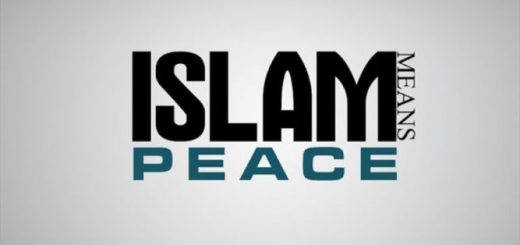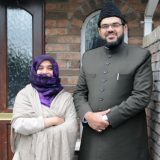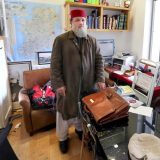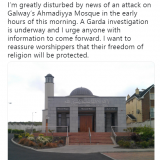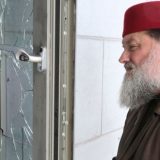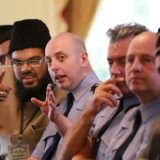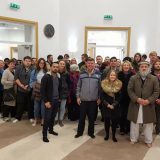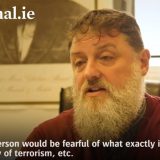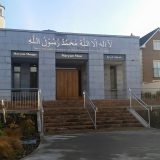Live on Liffey Sound FN (17-Jul-2018) after Jalsa Salana
This extract was originally recorded live on Liffey Sound FM on July 17, 2018.
The interview was with Dr Nauman Iftikhar by the host Nathan Walsh (approx. 14 minutes), and can be heard live from this link.
The transcript of the interview was created by the team of muslimwritersguild.ie. Some spoken English phrases (for example ‘’ah’’, ‘’thee’’, ‘’you know’’, ‘’I mean’’, “I guess”, etc) were removed, re-iterations were removed, coughs, laughs or other non-verbal voices were removed, and in some instances, the exact wording was modified to fit the message. We apologize for any errors created by this process, mis-spellings, or missed conversation.
Host: The Ahmadiyya Muslim Association of Ireland held its annual convention in the Glenroyal Hotel Maynooth in Kildare at the weekend. On the phone, I have Dr Nauman Iftikhar who is the press secretary of the Association and he is going to discuss what went on at the weekend and also give us a bit of an insight into what the Ahmadi Muslims is all about.
Good afternoon Dr Iftikhar
Dr Iftikhar: DGood afternoon Nathan, thanks for having me please, thank you.
Host: Thank you very much for speaking with us. [some omitted words]… before we go on talking about the convention for a moment maybe tell us a bit about the Ahmadiyya Muslim Association and how it differs from more orthodox Islam.
Dr Iftikhar: Sure Nathan, the Ahmadiyya Muslim Association is the Islamic religious movement, it’s the reform sect in Islam and it started back in 1889 under as we believe the divine appointment of a person named Hazrat Mirza Ghulam Ahmad in a remote town of India, Qadian. He was born in 1835 and passed away in 1908. So his title as we believe was divinely given by God as a Promised Messiah, metaphorically Jesus as you can say equalised that, and a Mahdi which most of the sects within Islam were waiting for and the purpose he was given or the mission which he was given was to propagate the peaceful teachings of Islam. It was also to restore Islam to its true intent and pristine form which as we believe it has lost through centuries, to refertilize Islam and set in motion its moral system that can bring about lasting peace. So how do we differ? I think we have ninety-nine percent similarities with orthodox Islam. We believe the six articles of faith, we believe in the five pillars of Islam, as most Muslims do. We believe Quran as our divine book, we face Kaaba when we pray five times a day and we follow the tradition of the Holy Prophet Hadhrat Muhammad (may peace and blessings be upon him) but the difference is that, there are Muslim brothers who are waiting for a man as a Mahdi, the reformer and the Jesus Christ as a different person yet to come. However we believe as I told before that Mirza Ghulam Ahmad of Qadian was a person who was promised to come. There is also sometimes a difference in the interpretation of the “holy war”. We believe that there is no place whatsoever now to indulge in a war which is based on Islamic or any religious basis. Their wars are always political and could be political. There is no compulsion as we believe in having a religion or going out of a religion. We also believe in an institution of Khilafat which is the successorship of the Promised Messiah, Mirza Ghulam Ahmad of Qadian, and our current supreme leader, Hazrat Mirza Masroor Ahmad who resides in London in an exile from Pakistan, is the fifth successor. There is a difference of the finality of the prophethood from the orthodox Muslims as well. We believe that the subordinate prophet in the footsteps of Holy Prophet Muhammadsa can still come, so God can send his reformers to guide humanity towards the divine mission and the mainstream Muslims believe that there’s no prophet whatsoever that can come in any shape or form. They are also waiting for Jesus Christ as the Prophet. So, these are the differences which we hold however as I said earlier most of our teachings are based on Quran and our practices are based on Sunah which we share with our fellow Muslim brothers.
Host: So, obviously there are a lot of similarities, but those differences, how do mainstream Muslims understand it and what do they feel about your interpretation of Islam? Is there a lot of tension between mainstream Muslims and yourselves?
Dr Iftikhar: Sure, you know the honest answer is the majority of the people don’t believe or they don’t take us as Muslims, they believe we are heretics, they believe we are infidels and, in some places, we are punished to death so they don’t share the beauty of difference of opinions which we are entitled to. So as a result, many countries like Pakistan, Bangladesh, Indonesia, Algeria are persecuting our community. For example in Pakistan there is a law by the State, if I say “Assalamo Alaikum” (may peace and blessings be upon you) the state will put me (in prison) just for saying that or even if my fellow Pakistani brother which I love, goes to the police and reports me that I was pretending to be a Muslim in any shape or form, I could be placed behind bars for three years. This Ordinance was put into place by the then-dictator Zia-ul-Haq to prosecute the Ahmadi Muslims. But saying all that, the majority of the Muslims have a civil sense and we share a very good relation with them, but at the same time the honest answer is we are facing prosecution by state and prosecution from our fellow Muslim brothers and sisters within the Muslim countries just on the basis of the difference which I told you that they think that we are a pseudo-Islam, not the true Islam. However, we believe we are true Islam.
Host: Of course, when I was doing the research for the programme there seemed to be high levels of persecution in some countries like; say Pakistan there seems to be a lot of persecution. Do you get the same kind of persecution in Ireland as you would in the more Muslims predominance countries?
Dr Iftikhar: In Ireland for example it’s a secular state and every citizen of the Irish land or UK or Western countries are entitled to hold their religious beliefs, to continue their religious practices which they want and most of the people living here they don’t have any problems in whatever we practice and whatever we believe unless until there is something anti-state and obviously within Ahmadiyya Islam, there is no place of fighting anyways as we believe in loyalty; the tradition of the Holy Prophet says “loyalty to the country is part of your faith”. So, from the fellow Irish or English or Western countries we don’t face any problems apart from Islamophobia due to misconceptions. Majority of the Muslims are peace-loving but because of the few bad people, the entire Muslim world gets the blame for that. This is our double problem in Pakistan we are not recognised as Muslims and worse. But to a smaller extent, any hate or any phobia against us in Ireland is due to being a Muslim, but the majority likes us. If your question was regarding our dealing with Muslims brothers within Ireland, most of the time this problem is not there but sometimes they exhibit a hate towards us not publicly because they can’t do so in public but in private, they may do. Sometimes, on social media, it reflects as they start talking and abusing of our Holy leader and our holy teachings and they mis-read or mis-interpret our teachings and these things go on and that can be a reflection of whatever they are saying in their minds and hearts about us.
Host: Okay now and I suppose you’re in a tough position in a sense that so from a lot of the main stream Muslims they see you as not being a true Muslim but then you mentioned about Islamophobia and certainly those people who have problems with Islam would certainly see you as Muslims so you may be getting it from both sides which is I guess is unfortunate for you.
Dr Iftikhar: You’re right, therefore we are working very hard, I think as a community everyone has a duty to not stereotype all the communities by the effect of the bad people or the bad emotions which a fraction of people do, so they have a responsibility not to stereotype and not to develop their hate within themselves. As a community, we also feel our responsibility to go out onto our streets and keep removing the misconception and one of those ways is to heavily indulging into the community activities, in the interfaith conferences and the peace symposiums. which we are holding internationally and also within Ireland for example as you have mentioned the 17th Annual convention within Ireland was a way to address our own audiences to tell them or to teach them to promote the peace teaching within them and also to outreach to the people, because guest are also invited including the members of Parliament including people from all walks of life to tell them the true message of Islam, to remove any misconception that can eventually lead to Islamophobia in any shape or form. So, we are on the forefront to minimise the misconception and I think most of the time the problem is ignorance and the remedy is knowledge, sharing peace, promoting our true teachings by interaction with the people and we are doing that.
Host: So, this conference is a way of reaching out and trying to dispel some of the myths. How did it go at the weekend? What kind of topics were being discussed at the conference in Maynooth?
Dr Iftikhar: As I told you the annual convention within Ahmadiyya Islam is a well-known entity which is over a hundred and twenty-seven years old. It was 1891 when the first annual convention happened and the first and foremost purpose is to uplift the spirituality of Ahmadi Muslims. It was started in Qadian and then spread all over the world. It is an international event held where the Khalifa of Islam, Hazrat Mirza Masroor Ahmad, or the Khalifa of the time lives; so that annual convention is the Central one. However, it’s also happening in almost all countries and even (within some countries) in every city. So foremost is to promote the teaching within our own community and then to invite our guests as well, so we can tell them this is what we preach and this is what we believe, to remove any misconceptions. This weekend was very successful, Ahmadi Muslims from all over Ireland travelled from Cork, from Northern Ireland, from Belfast, from Galway, from Limerick to join the convention. Our distinguished guests were including TD Ruth Coppinger (TD for Dublin West), she was there and then we had Emma Murphy, a local councillor, and a representative from An Garda Siochána Seargent David, he was also there along with people from the media and press and people from all walks of life. As you said the topic was the role of spirituality in boosting the moral values of oneself to form a peaceful society and learn the ways to work for the betterment of the fellow human being. One of the speeches was what was the role of a spiritual leader and what’s the need of a spiritual leader. We believe that there is a need for spirituality, there’s a need for a spiritual leader who can guide this society or world towards peace and I think this can only be done by a divinely appointed spiritual leader. And we believe in this day and time it can be done under the successorship of the Promised Messiah, Mirza Ghulam Ahmad, through Hazrat Mirza Masroor Ahmad, the divinely appointed Khalifa of Islam who resides in London and who is guiding this world by sermons, by speeches towards the peaceful solutions of the unfortunate problems which we are facing.
Host: Just out of curiosity what kind of numbers do you have in Ireland? Do you have many there in the Ahmadiyya movement in Ireland?
Dr Iftikhar: We have a very small number in Ireland, I think approximately five hundred to seven hundred. In the UK, for example, we are nearly under fifty thousand and if you’re talking about the world, we are in the tens of millions but we don’t have an exact number in the world but definitely from tens of millions in many countries. For example, as I said in Pakistan even if I don’t say anything, if someone goes and claims “he is pretending to be Muslim”, I would be behind bars. When the persecution and prosecution is there, it’s very difficult to get the exact number but we are in tens of millions across the world and we are represented in over nearly two hundred countries of the world.
Host: Okay well listen, I want to thank you very much for speaking with us today Dr Iftikhar, it’s been very interesting and I hope you are allowed to practice your religion in this country in peace and you don’t get too much hassle from either the Muslims who see you as a pseudo-religion or suffer too much Islamophobia.
Dr Iftikhar: Thank you very much, Nathan, for having me and presenting my views accordingly about Islam and thank you for your time and I sincerely thank you for your best wishes and we hope we can build a peaceful society everywhere in the world.
Host: Thank you, thank you very much, much Dr Iftikhar bye.
Dr Iftikhar: Thank you, thank you Nathan, take care bye.

